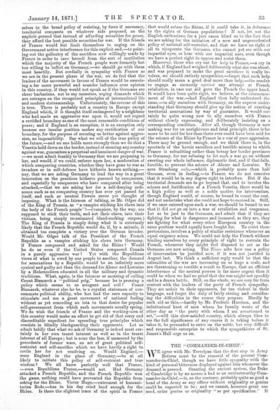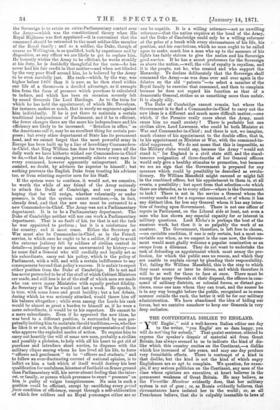THE " COMMANDER-IN-CHIEF."
WE agree with Mr. Trevelyan that the first step in Army Reform must be the removal of the present Com- mander-in-Chief, though we have little sympathy with the kind of personal bitterness displayed against him whenever the demand is pressed. Granting the ancient system, the Duke of Cambridge is by no means a bad or an untrustworthy Com- mander-in-Chief,—is, on the contrary, probably quite as good a head of the Army as any officer without originality or genius could be expected to be ; and we cannot, however great our need, order genius or originality "as per specification." If the Sovereign is to retain an extra-Parliamentary control over the Army—which was the constitutional theory when His Royal Highness was first appointed—it is convenient that the command should be entrusted to the-most soldier-like member of the Royal family ; and as a soldier, the Duke, though of course no Wellington, is as qualified, both by experience and by disposition, as any officer we are likely to get to replace him. He honestly wishes the Army to be efficient, he works steadily at his duty, he is decidedly thoughtful for the men—he has never had his fair credit in that matter—and when not blinded by the very poor Staff around him, he is believed by the Army to be even carefully just. His rank—which, by the way, was higher before 1866 than it is now, as he then stood within one life of a throne—is a decided advantage, as it exempts him from the form of pressure which purchase is calculated to induce, and which has been on occasion severely felt by sound Generals like Lord Hardinge. As to the term for which he has held the appointment, of which Mr. Trevelyan, for instance, makes so much, that is surely no argument against him individually. If he is put there to maintain a certain traditional independence of Parliament, and if he is efficient, the fewer changes there are the more his independence and his efficiency are likely to be increased. "Rotation in office," as the Americans call it, may be an excellent thing for certain pur- poses ; but every other department of State has its permanent head, and we cannot forget that the most powerful army in Europe has been built up by a line of hereditary Commanders- in-Chief, that King William has done for twenty years all the daily work we have hitherto wished our Commanders-in-Chief to do,—that he, for example, personally selects every man for every command, however apparently unimportant. He is assisted, no doubt, by advisers far superior to himself ; but nothing prevents the English Duke from trusting his advisers too, or from selecting superior men for his Staff.
If the system were to continue, it would not, we conceive, be worth the while of any friend of the Army seriously to attack the Duke of Cambridge, and our reason for hoping that he will resign, whether voluntarily or under pressure, is that the system cannot continue,—is, in fact, already dead, and that the new one must be entrusted to a new Commander-in-Chief. The Army was not a Parliamentary department. It is to be a Parliamentary department. The Duke of Cambridge neither will nor can work a Parliamentary department. That is no fault of his, for that is not the task he was appointed to perform ; but it is a misfortune for the country, and it must cease; Either the Secretary at War must also be Commander-in-Chief, as in the French service, in which case he ought to be a soldier, if only to avoid the extreme jealousy felt by soldiers of civilian control in details—a jealousy by no means unwarranted by history—or he must find a General who will cordially and loyally act as his subordinate, carry out his policy, which is the policy of Parliament, with a will, and with a certain indifference to any consequences beyond that policy's success. It is unfair to expect either position from the Duke of Cambridge. He is not and has never pretended to be of the stuff of which Cabinet Ministers are made, and still less is he of the stuff of which men are made who can serve many Ministries with equally perfect fidelity. As Secretary at War he would not last a week. He speaks, it is true, with some force and great lucidity; but a hot debate, during which he was seriously attacked, would throw him off his balance altogether ; while .even among the Lords his rank would be almost as great a burden to himself as, if he were a mere subordinate, it would be to his superiors. He cannot be a mere subordinate. Even if he approved the new ideas, he was bred to a different position, is surrounded by men per- petuallyinciting him to maintain the old traditions,—is,whether he likes it or not, in the position of chief representative of those who approve the exploded modes of action. To require him to carry out heartily the will of some new man, probably a civilian and possibly a plebeian, to help with all his heart to get rid of purchase and introduce short service, to dispense with the military clique among whom he has lived all his life, to force "officers and gentlemen " to be " officers and students," and to follow an ever-fluctuating current of national opinion, is to inflict on him a task which of itself would destroy his best qualification for usefulness, his sense of foothold on firmer ground than Parliamentary will, his never-absent feeling that the inter- est, or family, or person which presumes to exert " pressure" on him is guilty of vulgar bumptiousness. No man in such a position could be efficient, except by sacrificing every primd facie condition of efficiency, except through a self-obliteration of which few soldiers and no Royal personages either are or can be capable. It is a willing reformer—not an unwilling reformer—that the nation requires at the head of the Army, and the Duke of Cambridge could only be a willing reformer at the price of a break with every circumstance of his life, his position, and his convictions, which no man ought to be called upon to make, much less a man who up to the measure of his lights has fairly striven to give the nation and his Sovereign good service. If he has a secret preference for the Sovereign as above the nation,—well, the role of royalty is royalism, and it is the people, not he, who created and who support the Monarchy. To declare deliberately that the Sovereign shall command the Army—as was done over and over again in the debates on the old " patents "—to select a member of the Royal family to exercise that command, and then to complain because he does not regard his function as that of a democratic General, strikes us as something more than unfair. It is simply silly.
The Duke of Cambridge cannot remain, but where the Government is to find a Commander-in-Chief to carry out the new ideas is a different and much more difficult matter,—one which, if the Premier really cares about the Army, must cause him no small anxiety I There is probably but one civilian alive, Lord Lawrence, who could be both Minister at War and Commander-in-Chief ; and there is not, we imagine, much chance of his appointment to the double office, that is, to his appointment as Minister at War, with the command-in- chief suppressed. We do not mean that this is impossible, as the Military clubs would say, because the Army "would not stand it," for England is a civil state still, and the simul- taneous resignation of three-fourths of her General officers would only give a healthy stimulus to promotion, but because we see no sign that the Government is prepared for any measure which could by possibility be described as revolu- tionary. Sir William Mansfield might succeed or might fail in the combined offices, but his appointment to them is, at all events, a possibility ; but apart from that selection—to which there are obstacles, as to every other—where is the Government to look ? There is not in the service a General whom the country marks out for a supreme command, or of whom it has any distinct idea, far less any General whom it has any inten- tion of forcing upon Government. There is not one officer of repute in Parliament, on the Liberal side at least, not even a man who has shown any especial capacity for or interest in military questions. Lord Elcho's is perhaps the best of the amateur work, but then it is so palpably the work of an amateur. The Government, therefore, is left free to choose, —an enviable condition, if one is only certain, but a most un- enviable one when, as we suspect is the case now, the Govern- ment would most gladly welcome a popular nomination as an escape from a dilemma. They do not want to undertake the task of defending an appointment which must annoy the pro- fession, for which the public sees no reason, and which they are unable to explain except by pleading their responsibility. Yet, failing Sir William Mansfield, this is the step to which they must sooner or later be driven, and which therefore it will be as well for them to face at once. There must be among the many Generals at their disposal, the officers in com- mand of military districts, or colonial forces, or distant gar- risons, some one man whom they can trust, and the sooner he is in any way brought before the public, recognized as in some manner outside the ruck, the better it will be for our military administration. We have abandoned the idea of hiding our forces, but we contrive somehow to keep our Generals in very deep seclusion.



































 Previous page
Previous page